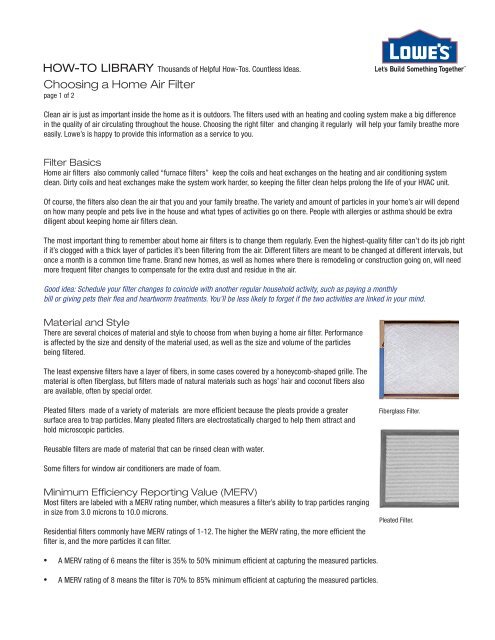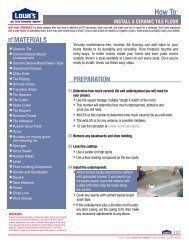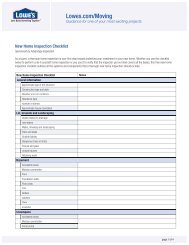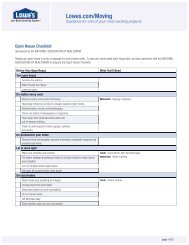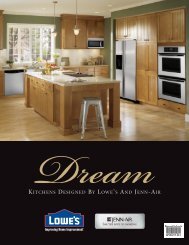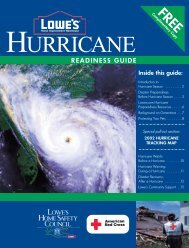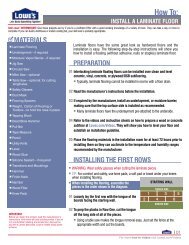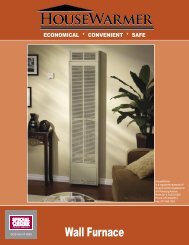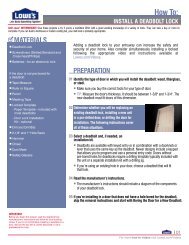You also want an ePaper? Increase the reach of your titles
YUMPU automatically turns print PDFs into web optimized ePapers that Google loves.
HOW-TO LIBRARY Thousands of Helpful How-Tos. Countless Ideas.<br />
<strong>Choosing</strong> a <strong>Home</strong> <strong>Air</strong> <strong>Filter</strong><br />
page 1 of 2<br />
Clean air is just as important inside the home as it is outdoors. The filters used with an heating and cooling system make a big difference<br />
in the quality of air circulating throughout the house. <strong>Choosing</strong> the right filter and changing it regularly will help your family breathe more<br />
easily. Lowe’s is happy to provide this information as a service to you.<br />
<strong>Filter</strong> Basics<br />
<strong>Home</strong> air filters also commonly called “furnace filters” keep the coils and heat exchanges on the heating and air conditioning system<br />
clean. Dirty coils and heat exchanges make the system work harder, so keeping the filter clean helps prolong the life of your HVAC unit.<br />
Of course, the filters also clean the air that you and your family breathe. The variety and amount of particles in your home’s air will depend<br />
on how many people and pets live in the house and what types of activities go on there. People with allergies or asthma should be extra<br />
diligent about keeping home air filters clean.<br />
The most important thing to remember about home air filters is to change them regularly. Even the highest-quality filter can’t do its job right<br />
if it’s clogged with a thick layer of particles it’s been filtering from the air. Different filters are meant to be changed at different intervals, but<br />
once a month is a common time frame. Brand new homes, as well as homes where there is remodeling or construction going on, will need<br />
more frequent filter changes to compensate for the extra dust and residue in the air.<br />
Good idea: Schedule your filter changes to coincide with another regular household activity, such as paying a monthly<br />
bill or giving pets their flea and heartworm treatments. You’ll be less likely to forget if the two activities are linked in your mind.<br />
Material and Style<br />
There are several choices of material and style to choose from when buying a home air filter. Performance<br />
is affected by the size and density of the material used, as well as the size and volume of the particles<br />
being filtered.<br />
The least expensive filters have a layer of fibers, in some cases covered by a honeycomb-shaped grille. The<br />
material is often fiberglass, but filters made of natural materials such as hogs’ hair and coconut fibers also<br />
are available, often by special order.<br />
Pleated filters made of a variety of materials are more efficient because the pleats provide a greater<br />
surface area to trap particles. Many pleated filters are electrostatically charged to help them attract and<br />
hold microscopic particles.<br />
Fiberglass <strong>Filter</strong>.<br />
Reusable filters are made of material that can be rinsed clean with water.<br />
Some filters for window air conditioners are made of foam.<br />
Minimum Efficiency Reporting Value (MERV)<br />
Most filters are labeled with a MERV rating number, which measures a filter’s ability to trap particles ranging<br />
in size from 3.0 microns to 10.0 microns.<br />
Residential filters commonly have MERV ratings of 1-12. The higher the MERV rating, the more efficient the<br />
filter is, and the more particles it can filter.<br />
Pleated <strong>Filter</strong>.<br />
• A MERV rating of 6 means the filter is 35% to 50% minimum efficient at capturing the measured particles.<br />
• A MERV rating of 8 means the filter is 70% to 85% minimum efficient at capturing the measured particles.
HOW-TO LIBRARY Thousands of Helpful How-Tos. Countless Ideas.<br />
<strong>Choosing</strong> a <strong>Home</strong> <strong>Air</strong> <strong>Filter</strong><br />
page 2 of 2<br />
• A MERV rating of 11 means the filter is 85% to 95% minimum efficient at capturing the measured particles.<br />
MERV is an industry standard rating, so it can be used to compare filters made by different companies. Some manufacturers also have their<br />
own rating systems.<br />
Size and Shape<br />
Most filters for residential HVAC systems are 1” thick, but some large houses (3,000 sq. ft. and more) require 4” filters because of the<br />
volume of air circulating in the home. The 1” filters come in a variety of sizes, so be sure to note what size you need before going to the<br />
store to make a purchase.<br />
Adjustable filters are available for non-standard ventilation openings. Special sizes and shapes of filters are available for room air<br />
conditioners, as well as for register vents and return vents in the floors, walls and ceilings.<br />
Good idea: Buy furnace filters several at a time, so you’ll always have one handy to make changing convenient.<br />
Special sizes and shapes of filters are available.<br />
These How-To’s are provided as a service from Lowe’s, the Original <strong>Home</strong> Improvement Warehouse of How-To information for the World Wide Web. The information in Lowe’s<br />
“How-To” clinics is intended to simplify jobs around the house. Tools, products, materials, techniques, building codes and local regulations change; therefore, Lowe’s assumes<br />
no liability for omissions, errors or the outcome of any project. The reader must always exercise reasonable caution, follow current codes and regulations that may apply, and<br />
is urged to consult with a licensed professional if in doubt about any procedures. Please read our terms of use.


